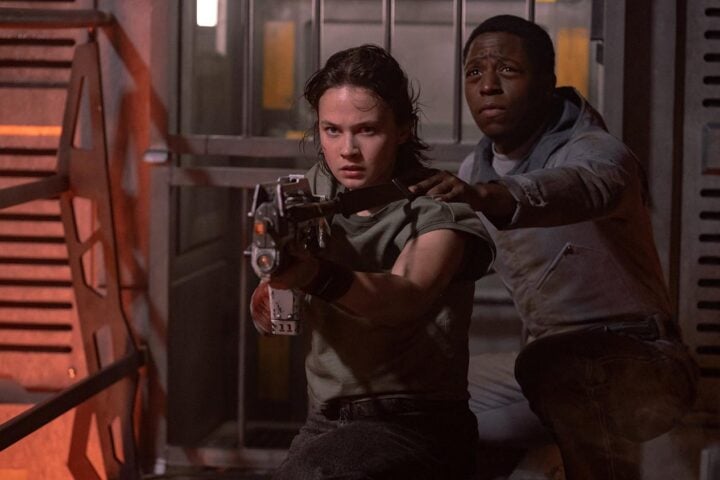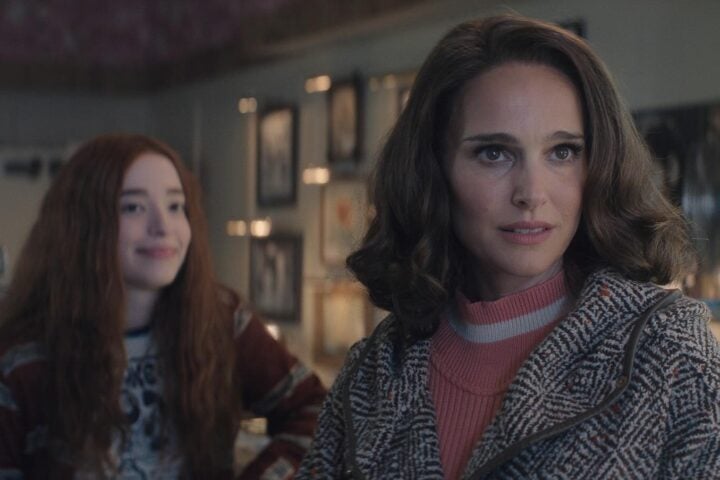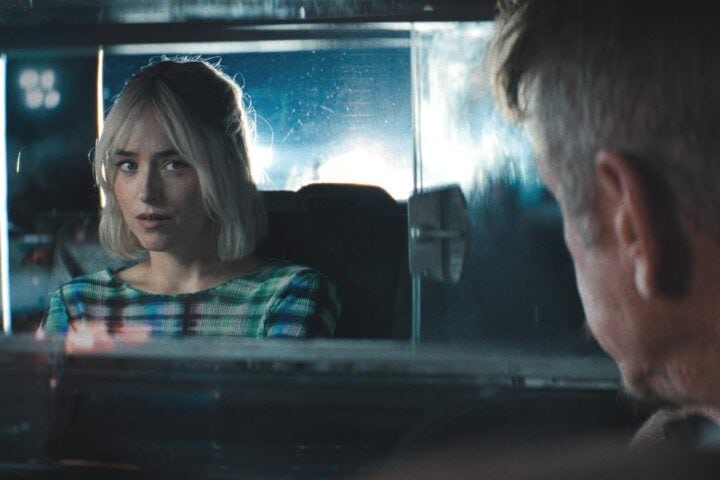S.J. Clarkson’s Madame Web is Sony’s latest attempt at maintaining rights to the Marvel characters they purchased decades ago. It’s a film so miscalculated, so reminiscent of the pre-MCU age of comic-book cinema, that it reminds audiences averse to the Marvel and DC cinematic universes of how much sloppier and stultifying the genre used to be.
The problems begin with the decision to adapt the character of Madame Web in the first place. In the comics, Cassandra Web is a blind, paralyzed old woman who spends her life hooked up to life support issuing precognitive predictions to Peter Parker and his allies. Even within the extended Spider-Man mini-universe, Cassandra is an afterthought, a fourth-string character at best. This film completely revamps Cassandra, turning her into Cassie (Dakota Johnson), a young paramedic who suddenly develops psychic abilities that draw her into a world with metahumans all linked by astonishingly tenuous connections to mutated spiders.
As Cassie begins to experience visions of the future, Madame Web morphs into a paranoid thriller. To her credit, Clarkson doesn’t fall prey to the bloat of recent superhero cinema, keeping the story relatively grounded. The TV veteran draws on her experience working on Marvel’s Jessica Jones in playing up the heightened tension between Cassie and the film’s villain, a fellow precog named Ezekiel Sims (Tahar Rahim), who also possesses arachnid-themed powers and is on the hunt for a trio of young women he believes may be fated to kill him. By coincidence or fate, Cassie ends up on a subway car with the women in question: Mattie (Celester O’Connor), Julia (Sydney Sweeney), and Anya (Isabela Merced). Cassie manages to whisk the girls to safety, causing Ezekiel to redouble his efforts to track them down.
There’s potential here for a tense chase film—of Ezekiel pursuing the women as Cassie struggles to anticipate his actions. Almost immediately, however, Madame Web grinds to a halt as it gets bogged down in scene after scene of characters, both good and bad, standing around explaining their backgrounds, hang-ups, and desires. Every few minutes, Cassie the reluctant guardian reminds everyone that she’s experiencing visions, or Ezekiel monologues to himself about how badly he needs to find Mattie, Julia, and Anya and kill them before they can grow up to become threats to his power. Eventually, the film reveals a connection that binds Cassie and Ezekiel, at which point the two individually and jointly rehash that plot point as well.
No one can make this kind of dialogue sound natural, but least of all Johnson, whose forte is playing young women who are awkwardly detached from others, sometimes even themselves. While that initially serves Cassie well in the early scenes that establish her as a misfit introvert, it becomes incongruous when she must assume the mantle of a hero. The film sets out a clear character arc for Cassie to develop from isolated shut-in to righteous protector, but Johnson never once conveys a sense that Cassie has any remote interest in anyone else’s well-being.
On the rare occasion that Madame Web deigns to provide any action whatsoever, it consists largely of incoherent bursts of overlaid images that are rendered all the more nonsensical by camera movements that knock the frame askew in a reflection of Ezekiel’s wall-crawling antics. The film’s attempts to counter the story’s wearisome exposition also spiral into the absurd with snap zooms occurring on nearly every cut during tense conversations. The nicest thing you can say about the action is that it tones down the CGI overload common to modern-day comic-book cinema, at least until the final act when things come to a head in such a farcical climax of animated sparks and explosions that it literally takes place in an abandoned fireworks factory.
Madame Web’s unremitting tedium is only exacerbated by having to play by the complex rules dictating Sony’s current deal with Disney, in which its standalone Spider-Verse movies have to broadly fit within Marvel’s plans for Peter Parker but can never show him or even mention him by name. It’s like being at a party where everyone has decided to shun someone and that someone is the host. But even more egregious is some of the most egregious moments of product placement in recent cinematic memory, with Pepsi products shown so frequently that the brand even factors into the film’s finale. Everything about Madame Web reeks of cynicism, a collection of tax and IP loophole exploitations masquerading as entertainment.
Since 2001, we've brought you uncompromising, candid takes on the world of film, music, television, video games, theater, and more. Independently owned and operated publications like Slant have been hit hard in recent years, but we’re committed to keeping our content free and accessible—meaning no paywalls or fees.
If you like what we do, please consider subscribing to our Patreon or making a donation.






I bet you Mr. Cole is going to feel very embarrassed when this rakes in 1 Webillion Dollars at the box office.
As if that is important to a review of the artistic qualities of an artwork. And how many is a ‘webillion’, anyway?
two morbillions